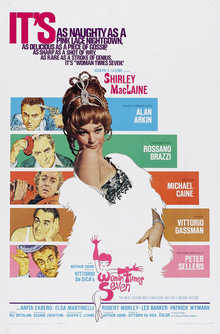
Vittorio De Sica was an Italian film director and actor, a leading figure in the neorealist movement.

Shirley MacLaine is an American actress and author. Known for her portrayals of quirky, strong-willed and eccentric women, she has received numerous accolades over her seven-decade career, including an Academy Award, an Emmy Award, two BAFTA Awards, six Golden Globe Awards, two Volpi Cups and two Silver Bears. She has been honored with the Film Society of Lincoln Center Tribute in 1995, the Cecil B. DeMille Award in 1998, the AFI Life Achievement Award in 2012, and the Kennedy Center Honor in 2013.

Two Women is a 1960 war drama film directed by Vittorio De Sica from a screenplay he co-wrote with Cesare Zavattini, based on the 1957 novel of the same name by Alberto Moravia. The film stars Sophia Loren, Jean-Paul Belmondo, Eleonora Brown and Raf Vallone. It tells the story of a woman trying to protect her young daughter from the horrors of war. The story is fictional, but based on actual events of 1944 in Rome and rural Lazio, during the Marocchinate.

Irma la Douce is a 1963 American romantic comedy film directed by Billy Wilder from a screenplay he co-wrote with I. A. L. Diamond, based on the 1956 French stage musical of the same name by Marguerite Monnot and Alexandre Breffort. The film stars Jack Lemmon and Shirley MacLaine.
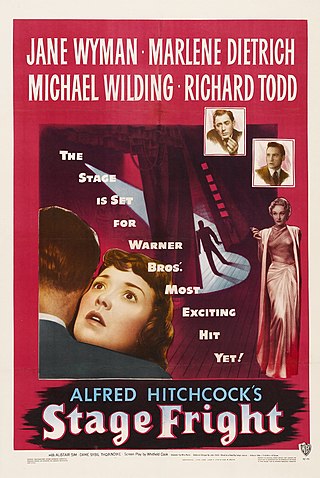
Stage Fright is a 1950 British thriller film noir directed and produced by Alfred Hitchcock and starring Jane Wyman, Marlene Dietrich, Michael Wilding and Richard Todd. The cast also features Alastair Sim, Sybil Thorndike, Kay Walsh, Hitchcock's daughter Pat Hitchcock in her film debut, and Joyce Grenfell in a vignette.
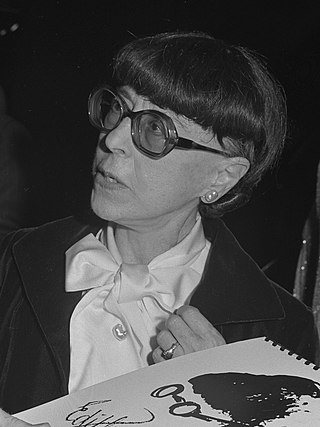
Edith Head was an American costume designer who won a record eight Academy Awards for Best Costume Design between 1949 and 1973, making her the most awarded woman in the Academy's history. Head is considered to be one of the greatest and most influential costume designers in film history.
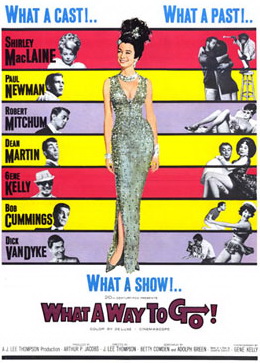
What a Way to Go! is a 1964 American black comedy film directed by J. Lee Thompson and starring Shirley MacLaine, Paul Newman, Robert Mitchum, Dean Martin, Gene Kelly, Bob Cummings and Dick Van Dyke.
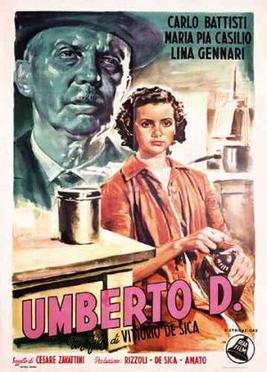
Umberto D. is a 1952 Italian neorealist film directed by Vittorio De Sica. Most of the actors were non-professional, including Carlo Battisti who plays the title role of Umberto Domenico Ferrari, a poor elderly man in Rome who is desperately trying to keep his rented room. His landlady is evicting him and his only true friends, the housemaid and his dog Flike are of no help.

Joseph Edward Levine was an American film distributor, financier, and producer. At the time of his death, it was said he was involved in one or another capacity with 497 films. Levine was responsible for the U.S. releases of Godzilla, King of the Monsters!, Attila and Hercules, which helped revolutionize U.S. film marketing, and was founder and president of Embassy Pictures.
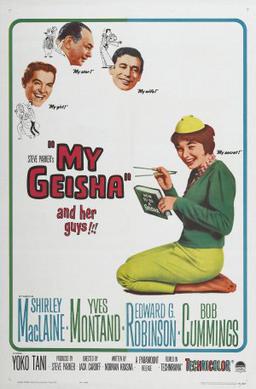
My Geisha is a 1962 American comedy film directed by Jack Cardiff, starring Shirley MacLaine, Yves Montand, Edward G. Robinson, and Bob Cummings and released by Paramount Pictures. Written by Norman Krasna, based on Krasna's story of the same name, the film was produced and copyrighted in 1961 by MacLaine's then-husband Steve Parker. The world premiere was at the Plaza Theatre in London's West End on January 18, 1962.
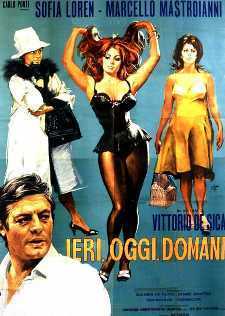
Yesterday, Today and Tomorrow is a 1963 comedy anthology film by Italian director Vittorio De Sica. It stars Sophia Loren and Marcello Mastroianni. The film consists of three short stories about couples in different parts of Italy. The film won the Academy Award for Best Foreign Language Film at the 37th Academy Awards.

The Monte Carlo Story is a 1956 romantic comedy-drama film written and directed by Samuel A. Taylor, based on an original story by Taylor, Marcello Girosi, and Dino Risi. Marcello Girosi produced the film, which was the first shot in the Technirama process. Jean Louis designed the costumes.

The Earrings of Madame de... is a 1953 romantic drama film directed by Max Ophüls from a screenplay he co-wrote with Marcel Achard and Annette Wademant, based on the 1951 novel Madame de... by Louise Lévêque de Vilmorin. The film is considered a masterpiece of 1950s French cinema. Andrew Sarris called it "the most perfect film ever made". Ophüls said the story's construction attracted him, stating "there is always the same axis around which the action continually turns like a carousel. A tiny, scarcely visible axis: a pair of earrings".

Sweet Charity is a 1969 American musical comedy-drama film directed and choreographed by Bob Fosse in his feature directorial debut, written by Peter Stone, and featuring music by Cy Coleman and Dorothy Fields.
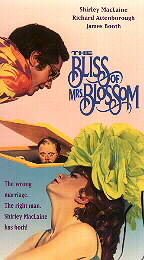
The Bliss of Mrs. Blossom is a 1968 British comedy film directed by Joseph McGrath. The screenplay by Alec Coppel and Denis Norden was adapted from a play by Coppel that was based on a short story by Josef Shaftel, who served as the film's producer.
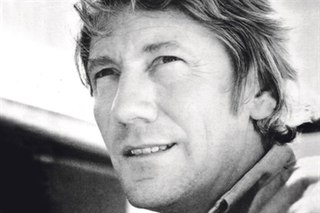
Clinton Greyn was a Welsh-born actor noted for his appearances in British television series of the 1960s and 1970s.
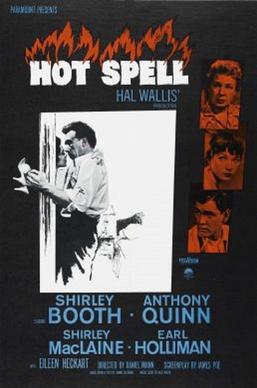
Hot Spell is a 1958 American drama film directed by Daniel Mann, starring Shirley Booth and Anthony Quinn, and released by Paramount Pictures.

Boccaccio '70 is a 1962 comedy anthology film directed by Vittorio De Sica, Federico Fellini, Mario Monicelli and Luchino Visconti from an idea by Cesare Zavattini. It consists of four episodes, each by one of the directors, all about a different aspect of morality and love in modern times in the style of Giovanni Boccaccio.

Wild Oats is a 2016 American comedy film directed by Andy Tennant and written by Gary Kanew and Claudia Myers. The film stars Shirley MacLaine, Jessica Lange, Demi Moore and Billy Connolly in his final film role before retirement. The film premiered on Lifetime on August 22, 2016, prior to being released in a limited release on September 16, 2016, by The Weinstein Company and RADiUS-TWC.
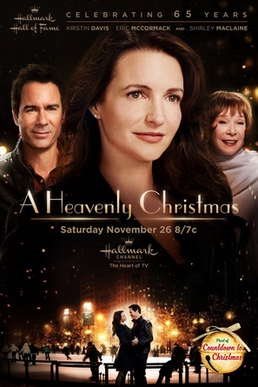
A Heavenly Christmas is a 2016 American television film starring Kristin Davis, Eric McCormack and Shirley MacLaine.
